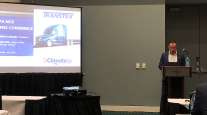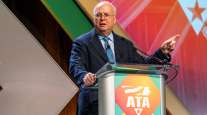Shuster Predicts Highway Bill Will Reach Obama This Year

“There are obviously some differences with the Senate bill, but the fact that [Senate Environment and Public Works Committee Chairman James Inhofe] and I are probably on the same page on 95% [means] that it will probably be a short [House-Senate] conference,” Shuster said in an exclusive interview with Transport Topics after his speech at American Trucking Associations’ Management Conference & Exhibition here. “I think we’ll probably be able to get it done and on the president’s desk by the end of the year.”
Shuster said he would support Paul Ryan (R-Wis.) for Speaker of the House but is far from sure that his friend will take the job, adding that current Speaker John Boehner (R-Ohio), who announced his intention to step down by the end of the month, might be forced to remain in the position for another year.
“He’s still thinking about it,” Shuster said of Ryan, whom he talked to last week. “It’s not a job he wanted. It’s a tough job. If these 40 or so of our colleagues are going to continually use the rules against us, I don’t know how we move forward.”
Shuster’s main job is to move the highway bill forward, but he issued a challenge to ATA and other stakeholders to think beyond the current legislation that he believes will emerge after yet another in a series of short-term funding extensions.
“Everybody wants a long-term bill,” Shuster said. “Everybody knows it’s important to the United States’ economy. … We’ve got to figure out how we’re going to fund it into the future … because if we don’t, four years, five years from now when we’re getting ready to do the next highway bill, we’re going to have the same fight.”
Shuster named such funding alternatives as a fuel-tax increase, pay-by-mile programs and tolling.
“Every American is in the transportation business,” Shuster said, referring to the products that people consume every day that are delivered by trucks. “Every single one of us is touched by the system every day. We’re all in this together.”
Shuster, who worked in the tire and auto industries before coming to Congress, has a special relationship with the trucking industry.
“I really truly understand where you’re coming from,” said Shuster, noting the inclusion in his bill of a pilot program that allows the training of drivers at age 19 1/2 rather than the current CDL minimum age of 21. “Trucking is the backbone of America.”
Shuster praised the work of ATA in fighting for its goals “in an environment that has been very, very hostile to your industry. The [Obama] administration and its agencies that regulate and put rules out, they’re not friendly to your industry.”
However, the congressman urged ATA’s members with varied interests to come together as one when it comes to fighting for trucking on Capitol Hill and in state capitols.
Shuster also said that every governor he has talked to believes that the federal government must continue to play an important role in transportation.
“It just won’t work if the federal government’s not involved,” Shuster said, citing a road that Kansas once built but Oklahoma didn’t have the money to continue. “[It’s] a core function of government.”
Shuster cited his work on water resources legislation that passed overwhelmingly and his relationship with Peter DeFazio (D-Ore.), the ranking Democrat on the Transportation and Infrastructure Committee, as reasons for his optimism about the highway bill being approved with “the long-term funding that we desperately need” but not if it adds to the deficit or the amount of bureaucratic red tape.
Shuster’s bill proposes reforms to the Federal Motor Carrier Safety Administration, an announcement that prompted applause from the audience.
“We reform programs that unfairly target safe truck and bus operators and will help ease administrative burdens on small businesses,” Shuster said. “This bill facilitates commerce by expanding the highway freight network. For the first time dedicated funding will be available for freight projects. … We need to make sure that Washington, D.C., doesn’t stand in the way of innovation … nor does it force technology [on the private sector] that doesn’t make sense.”




